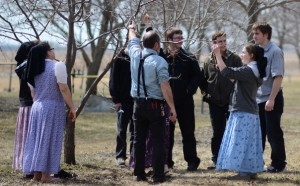Secondary Education
Teacher Training
A teacher-training program, Brandon University Hutterian Education Program (BUHEP), was set up in 1995, and twenty students from the first BUHEP group graduated in October of 1999. Today over 70 Hutterian teachers have completed their training at Brandon University in Manitoba, Canada. The program is still in existence and continues to graduate Hutterian teachers albeit at a lot slower rate than the initial years.
BUHEP
Many of the Schmiedeleut Hutterian Colonies have found it more suitable and appropriate to have teachers from their own colonies. As a result of interest by several colonies, a program called BUHEP (Brandon University Hutterian Education Project) was initiated in 1995.
The BUHEP program began with Brandon University, in Brandon, Manitoba, Canada. Brandon University professors provide the training for Hutterian students. Typically students take their courses during the summer months and for the rest of the school year, they work as interim teachers in different classroom setting. Initially courses were also taken off-campus, often on Hutterite colonies, during the year, but due to low enrollment that practice has been discontinued.
The BUHEP program marks the first time that such a large group of Hutterites has been involved with post-secondary education. Twenty-one Hutterites were part of the first group of BUHEPers, seventeen joined the second group, and over twenty enrolled in the third group. The numbers attending today are a lot lower, counting perhaps half a dozen, but the program continues and has graduated over 70 Hutterian educators over the past decade.
It should be noted that the majority of Hutterite colonies in North America do not have Hutterian teachers; teachers, Hutterian or non-Hutterian are hired by their respective school districts to serve the colonies’ needs.
Vocational Training
In addition to teacher training, many Hutterites have been taking vocational training courses in electrical, plumbing, motor vehicle mechanics, carpentry and swine management fields and other areas. State and provincial laws have helped to motivate Hutterites because in order for Hutterite electricians to do certified work on their own colonies, licensed workers are required. Some take advantage of partnerships with local colleges to complete their certification in various fields with the course often delivered via distance education. Many Hutterites have completed their electrician and other training over the past few years and are licensed to do the required work on their colonies.
Informal Apprenticeship
In addition to formal education, Hutterites continue to rely on and emphasize work education. Young people are assigned different jobs on the colony for months or years at a time in order to learn a trade.

High school students receiving a botany lesson.
For example, a young man aged 15 or 16 might work with the farm manager for the summer months, and spend the winter months with the carpenter on a building project. This apprenticeship helps them to learn different trades on the colony. As a result, their demonstrated aptitude in different areas is considered by the colony leaders when placing these workers into longer term positions.









 If you have any questions, suggestions or feedback or require more information about the hutterites, be sure to contact us
If you have any questions, suggestions or feedback or require more information about the hutterites, be sure to contact us